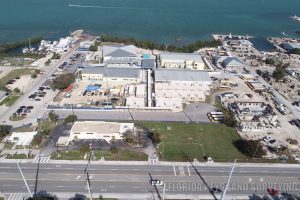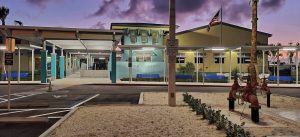PLANNING MAKES PERFECT: Stanley Switlik Elementary School, Marathon, FL
Construction on an active site is complicated for any project. But when the project is an elementary school, the stakes are even higher. Phasing and scheduling must be organized around the daily schedule of school, around the constant motion of children, and around the environment, students and staff need to succeed.

That was the challenge facing the Ajax team when they embarked on a two-year effort to renovate and expand Stanley Switlik Elementary School in Monroe County, Florida—aka, the Florida Keys. The overhaul of the school campus involved renovating some of the existing buildings, replacing others with brand-new facilities, and adding parking areas, athletic fields, a central courtyard, a dock, and a transportation center… all while school was in session.
“We had to have a very well-thought-out-plan developed around the school calendar,” says Michael Wilson, Ajax Building Company operations manager. “Keeping the kids safe and in a consistent teaching environment was critical.”
That plan included building a temporary campus on-site for administration and some classroom space, as well as replicated IT and communication systems to replace those put out of commission when the original administrative building was demolished. Then the sequenced phases of demolition, temporary relocation, renovation, and moving into the new facilities would continue to cycle as each building opened, with some fast-track work slated for the summer months.
CHANGE OF PLANS
The Ajax team was successfully and safely moving along with that plan when the school year—and everything else—changed due to COVID-19. The State of Florida initially closed the schools for a few weeks, which led the Ajax team to quickly consider what they could ramp up with this unexpectedly empty site. “At first we thought, ‘What can we bite off in these few weeks and put back together before the kids come back?’,” says Wilson. “Then they closed school for the year and our floodgates opened. With the campus free of people, we were able to stop renting the temporary campus components and gear up our remaining phases.” The level of detail of their original planning helped clearly map out the next steps. And because construction was limited in sur-rounding areas of south Florida, addition-al work crews were ready and willing to take on the job.

THE COVID-19 FACTOR
While the pandemic released pressure on the schedule, it did, of course, have different kinds of impacts on how the project was managed.
- Access to the Keys. As the virus spread, the state added a checkpoint at the entrance to the Keys on US Highway 1, asking travelers to present proof of their reason for being there. The Ajax team had to work with its subcontractors to ensure all workers on the job had a copy of the project contract, a letter from their company, and an ID badge from the school district.
- Lodging for workers. Because workers were coming from elsewhere for the project, it made sense to find them local lodging. However, that was easier said than done. “Most hotels were shut down, and there was a lot of confusion at the time about what was allowed,” says Wilson. “It took some time to find a pool of hotels who were able to house our workforce.”
- Jobsite updates. Like every jobsite, the project site needed to implement recommended COVID-19 safety measures, from added signage and forms to enforcing face coverings, social distancing, and other guidance. And with the heat of Florida, that also included a heightened awareness of worker overheating and ensuring all trades had ample water and shade for breaks.
- Training. All of these unexpected changes meant a lot of communication and training—quickly. “We had to train our staff and our subs on all of this,” Wilson says. “But we wanted everyone to be safe and productive, so we just had to make sure we got ahead of everything best we could and communicate it.”
READY FOR ANYTHING
Even before the pandemic, the Ajax team was no stranger to emergency response in the Keys. In the fall of 2017, the team was in the midst of another campus renovation for the Monroe County School District at Gerald Adams Elementary School in Key West when Hurricane Irma hit. But, says Wilson, that’s an emergency Floridians know and understand. The pandemic was a different story. “We have hurricane preparedness plans, early warning signs, protocols, and steps we take when a hurricane is coming,” he says. “That’s the opposite of a pandemic. There are just so many unknowns.” Despite the challenges and the delays that COVID-19 could have caused, the project will be completed on time in August 2020, due in large part to the empty school cam-pus that COVID-19 created.
“We didn’t see any lapse in production throughout all the uncertainties,” Wilson says. “I was very proud and impressed that we were able to stay on schedule and keep people safe.”
